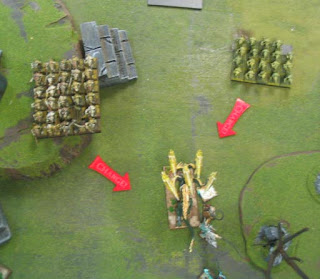
About Worgl.
I was a little pressed for time yesterday after posting the article about Worgl. I had meant to make some comments.
Firstly, I often hear others expressing dismay over what may be the collapse of the dollar, or some kind of ominous and un-named financial disaster in the relatively near future. To that I say, don’t worry about that. Do get ready and make reasonable precautions, but it’s the parasites that have to fear. It’s the common man who actually produces something that will be looking good if only he can grasp what is really happening.
If the dollar does collapse (or partially collapse which is already in process) I believe that local communities will step up and take care of business. I am very optimistic about this.
I saw a discovery-channel-type program where this guy went on a biking trip in Belize and a bot fly laid eggs in his scalp. This ring of five sub-dermal maggots tormented him for weeks until he realized what was happening, then it was a simple matter to remove them.
Now, imagine that the bot-fly-maggots are invisible, three feet long, and sucking out a third of your blood and you’ve got the picture of what’s happening to you financially. On the TV they call it a “recession”. It’s a mysterious thing that just happens. No, not really.
Just to be absolutely clear, I have no hatred or ill-will in my heart. I am careful to guard against this. What I really feel is sadness. I am sad because I know that all of this will come to light in the next life and I think that there will be a gulf that yawns open between those that were taken advantage of and those that understood the system by which they were stripped of their goods. They will see the sorrow of a young married couple with little kids who lost their home, or couldn’t pay the bills. In short, I am sad for the bankers and senators.
I am reminded of the story of Abraham and Lazarus (see below). OH YES I WENT THERE!
It also occurs to me that social programs may be the means of closing that gulf. Am I absolved of my responsibility to my fellow-man by paying my taxes? I don’t believe that’s enough, not nearly enough. But it’s something to think about.
This line of thinking also makes a great and terrible burden settle on my heart as a small business owner. If the business is prosperous I have a responsibility to those that work for me. And in the next life (not too far away! Maximum forty years!) the books will be opened and they will see how they fared.
For my part I am happy. When I harp on these things it is not because I am dissatisfied with my situation on the net. On the contrary, I am thrilled and fanatically grateful for what I have. And I praise God and give Him credit for it. It also crosses my mind that if there are behind-the-scenes overlords pulling the strings then maybe they’re not doing such a bad job. [a posting about this is coming soon]. I’ve got what I want in terms of material goods: a splendidly painted Dark Elf army. Don’t really need much more.
But that’s not really the point. A well-cared-for subservant is still a subservant.
Back to my employees. If BTP is prosperous I have a duty and a stewardship to see that it is managed properly and benefits those that work there, those that labor. Labor is sacred. The product of a man’s hands and sweat is holy and it’s a grave matter to defraud him of it. And even more to take it from him by force.
When I take profits from the business it is generally not for myself, but for four children who depend on me completely to take care of their physical needs. I protect them against hunger, tooth decay, ailments of the body, and so forth. Oh, and clothes. Not to mention some of the icing of life. And the happiness of a wife who just loves her security. You married men know what I’m talking about.
There is another factor. I don’t know the full story. Only the Lord knows the whole situation. I admit the possibility that I am wrong. For all I know the boards of the ten banks on main street Spanish Fork are kind and benevolent who really have the welfare of the common man at heart. It’s not such a stretch. I have a friend, a business mentor, who is starting a bank up north. This has ripped my mind in two. He’s such an upright person, and a pillar of the community, and was such a great help to me in my formative time as a businessman. It baffles me that he’s involved in this dirty business. I’m not sure how to broach the matter, if at all, or if he even would have time for it.
Remember: war, poverty, and central banking are all related. I am a proponent of putting the maximum amount of power (time/money/will etc.) into the hands of the individual. I believe in the wisdom and goodness of the small community.
(1) Abraham and Lazarus (Luke 16)
19 ¶ There was a certain rich man, which was clothed in purple and fine linen, and fared sumptuously every day:
20 And there was a certain beggar named Lazarus, which was laid at his gate, full of sores,
21 And desiring to be fed with the crumbs which fell from the rich man’s table: moreover the dogs came and licked his sores.
22 And it came to pass, that the beggar died, and was carried by the angels into Abraham’s bosom: the rich man also died, and was buried;
23 And in hell he lift up his eyes, being in torments, and seeth Abraham afar off, and Lazarus in his bosom.
24 And he cried and said, Father Abraham, have mercy on me, and send Lazarus, that he may dip the tip of his finger in water, and cool my tongue; for I am tormented in this flame.
25 But Abraham said, Son, remember that thou in thy lifetime receivedst thy good things, and likewise Lazarus evil things: but now he is comforted, and thou art tormented.
26 And beside all this, between us and you there is a great gulf fixed: so that they which would pass from hence to you cannot; neither can they pass to us, that would come from thence.
27 Then he said, I pray thee therefore, father, that thou wouldest send him to my father’s house:
28 For I have five brethren; that he may testify unto them, lest they also come into this place of torment.
29 Abraham saith unto him, They have Moses and the prophets; let them hear them.
30 And he said, Nay, father Abraham: but if one went unto them from the dead, they will repent.
31 And he said unto him, If they hear not Moses and the prophets, neither will they bepersuaded, though one rose from the dead.
PS- don’t think that it’s escaped notice that I might very well be the rich man in this parable. Who is laid at my gate? Who could I have helped but didn’t? What can I do more?

My good friend Mike D. came down for a game tonight– a perfect Saturday night. I shot a ton of footage and plan on making a rather detailed battle report. Here’s the army list I took. This includes the exact spells I rolled up. It’s a pretty tough list with a TON of magic (something like 19 casting dice) and shooting (spellcasters have Flames of Tzeentch for shooting).
I think for the Herald on Disc it might be better to go with Tzeentchian magic rather than the Lore of Shadows.
I greatly enjoy playing this army. Win or lose it’s a fun time with lots of crazy stuff going on.
2500 Pts – Daemons of Chaos Roster – Fateweavers
Lord of Change (1#, 605 pts)
1 Lord of Change @ 605 pts (Flaming Attacks; General; Hand Weapon; Level 4 Wizard; Causes Fear; Causes Terror; Daemonic; Flyer; Immune to Psychology; Large Target)
1 Tzeentch’s Will
1 3. Glean Magic
1 4. Gift of Chaos
1 5. Bolt of Change
1 6. Tzeentch’s Firestorm
Herald of Tzeentch (1#, 185 pts)
1 Herald of Tzeentch @ 185 pts (Flaming Attacks; Hand Weapon; Locus of Tzeentch; Level 2 Wizard; Causes Fear; Daemonic; Immune to Psychology)
1 Disc of Tzeentch (Flaming Attacks; Causes Fear; Daemonic; Flyer; Immune to Psychology)
1 Master of Sorcery
1 Flames of Tzeentch
1 1. Steed of Shadows
1 2. Creeping Death
1 3. Crown of Taidron
1 4. Shades of Death
1 5. Unseen Lurker
1 6. Pit of Shades
Herald of Tzeentch (1#, 140 pts)
1 Herald of Tzeentch @ 140 pts (Flaming Attacks; Hand Weapon; Locus of Tzeentch; Level 2 Wizard; Causes Fear; Daemonic; Immune to Psychology)
1 Flames of Tzeentch
1 2. Boon of Tzeentch
1 6. Tzeentch’s Firestorm
Herald of Tzeentch (1#, 240 pts)
1 Herald of Tzeentch (Battle Standard Bearer) @ 240 pts (Flaming Attacks; Hand Weapon; Locus of Tzeentch; Level 2 Wizard; Battle Standard Bearer; Causes Fear; Daemonic; Immune to Psychology)
1 Great Icon of Despair
1 Flames of Tzeentch
1 1. Flickering Fire of Tzeentch
1 4. Gift of Chaos
Pink Horrors of Tzeentch (31#, 463 pts)
30 Pink Horrors of Tzeentch @ 463 pts (Flaming Attacks; Hand Weapon; Musician Mus; Standard Bearer Std; Daemonic Icons; Causes Fear; Daemonic; Immune to Psychology)
1 The Changeling (Flaming Attacks; Hand Weapon; Causes Fear; Daemonic; Immune to Psychology)
1 Banner of Change
1 1. Flickering Fire of Tzeentch
1 4. Gift of Chaos
1 5. Bolt of Change
Pink Horrors of Tzeentch (30#, 403 pts)
30 Pink Horrors of Tzeentch @ 403 pts (Flaming Attacks; Hand Weapon; Musician Mus; Standard Bearer Std; Daemonic Icons; Causes Fear; Daemonic; Immune to Psychology)
1 Banner of Change
1 1. Flickering Fire of Tzeentch
1 4. Gift of Chaos
1 5. Bolt of Change
Pink Horrors of Tzeentch (10#, 157 pts)
10 Pink Horrors of Tzeentch @ 157 pts (Flaming Attacks; Hand Weapon; Standard Bearer Std; Daemonic Icons; Causes Fear; Daemonic; Immune to Psychology)
1 Banner of Change
1 1. Flickering Fire of Tzeentch
Pink Horrors of Tzeentch (10#, 157 pts)
10 Pink Horrors of Tzeentch @ 157 pts (Flaming Attacks; Hand Weapon; Standard Bearer Std; Daemonic Icons; Causes Fear; Daemonic; Immune to Psychology)
1 Banner of Change
1 1. Flickering Fire of Tzeentch
Flamers of Tzeentch (4#, 140 pts)
4 Flamers of Tzeentch @ 140 pts (Flaming Attacks; Hand Weapon; Causes Fear; Daemonic; Immune to Psychology; Skirmishers)
1 Flames of Tzeentch
Validation Report:
Army Subtype: Daemons of Chaos; Edition: 7th Edition; Game Type: Normal Game; Special
Roster satisfies all enforced validation rules
Total Roster Cost: 2490
Created with Army Builder – Try it for free at http://www.wolflair.com

Last night we had the staff Christmas Party up at Sarah’s. It was perfect. After hanging out for a few hours, snacking on finger food, we went upstairs to play Rock Star 2. Video forthcoming.
We got home around 1am.
This last week we celebrated Willow’s first birthday. As a Gately Family tradition we baked her a medium-sized chocolate cake and let her go to town on it by herself. She just had a great time with it.
I happened on this very interesting article about a small town called Worgl. It is my belief that this is what happens when the pressure exerted on the economy by banks is lifted:
Worgl
More about Worgl (I have repeated this article below)
Also of interest is this article about Liberty Dollars
I found this article absolutely fascinating. What happened in this town is completely in line with what I think is really going on re: my earlier articles about banks in my small town. It is my theory that with the elimination of excessive taxation and the effects of fractional reserve banking, your material condition would improve by at least double. Half your life is invisibly taken from you.
Think of it this way, if you live to age 75 and begin working full time at age 20, you will work about 110,000 hours. This represents your life in terms of labor. If an outside force takes twenty percent of your income somehow without returning something else of value, it has taken the equivalent of 22,000 hours of your labor or literally sucked out your life. When the constitution says your life, liberty, and pursuit of happiness, your life is your labor.
Community Currency
There was a time when people were so convinced that the earth was flat, that the idea that it was round was inconceivable.
Likewise today, the idea of a community or region issuing and using its own currency and running its own bank may seem just inconceivable.
But it has happened.
The Worgl Schillings
In the early 1930s the small town of Worgl in the Austrian Tyrol, suffering like every other town in Europe and America from the Great Depression, took the unlikely step of issuing its own currency.
Its burgomaster, Michael Unterguggenberger, faced an empty treasury, because the unemployed citizens could not pay their taxes; roads and bridges needed repair and parks needed maintenance, for which the town could not pay; and idle men and women earned no wages.
He recognised that all three problems could be solved if he could find the connecting link.
That link was money. The three problems coexisted because no one had any of it, and his simple solution was to create money locally.
He issued numbered ‘labour certificates’ to the value of 32,000 schillings, in denominations of 1, 5 and 10 schillings, respectively. These became valid only after being stamped at the town hall, and depreciated monthly by 1 per cent of their nominal value.
It was possible for the holders to ‘revalue’ them by the purchase, before the end of each month, of stamps from the town hall, in the process creating a relief fund.
‘The small town of Worgl in the Austrian Tyrol, suffering like every other town in Europe and America from the Great Depression, took the unlikely step of issuing its own currency’
The depreciation not only encouraged rapid circulation, but also the payment of taxes, past, current and upcoming. These taxes were used to provide social and public services.
At the end of each year, it was required that the notes be turned in for new ones. No charge was made for the transaction if the required stamps had been affixed. Subject to a 2 per cent deduction, the town also undertook to convert the labour notes into Austrian schillings.
To facilitate this conversion at any time – and thereby provide a cover for the relief certificates – the trustees deposited at the local Raiffeisen Bank (credit union) an amount in Austrian currency equivalent to the issued local currency.
The money was loaned out to trustworthy wholesalers at 6 per cent interest. Interest thereby flowed back into the town treasury, yet further facilitating transactions with the ‘outside’ world.
Wages paid in the new money
The burgomaster put this money into circulation by paying 50 per cent – later raised to 75 per cent – of the wages of the town’s clerical and manual workers in the new money.
The workers found that all businesses in Worgl accepted the currency in payment and at face value, and the notes returned to the parish treasury as dues and taxes. Economically, there was no inflation, and politically, the money was unanimously acceptable to all the municipal parties.
‘Because it was a depreciating currency, it circulated with rapidity, boosting the local economy. Further, many paid their taxes in advance because it was financially advantageous’
Because it was a depreciating currency, it circulated with rapidity, boosting the local economy. Also, not only did people merely pay their current taxes in the currency, but also discharged their tax arrears. Further, many paid their taxes in advance because it was financially advantageous.
Apart from the obvious employment benefits, physical assets were created. These included improvements in the main street and its drainage system, street lighting, new road construction, manufacturing of kerb stones and drainage pipes, construction of a ski-jumping platform, and fencing and construction of a new water reservoir.
Although the Worgl money was unanimously accepted at the local level, there was great opposition from two centralist forces – the Tyrol Labour Party and the Austrian State Bank.
In both cases, there seemed to be the fear of the experiment spreading, for the idea was copied by the neighbouring town of Kirchbichel. The town monies were valid in both places. Other towns in the Tyrol also decided on issuing depreciating money, but did not proceed because of threats from the State Bank.
The experiment curtailed
Ultimately, the State Bank threatened legal proceedings and on September 1st 1933, the experiment was terminated.
In an analysis, Unterguggenberger concluded that depreciating currency fulfils the functions of money much better than unvarying nationalised currency. He noted that no difficulties or complaints had arisen in making payments in the new currency or in affixing stamps, and that the local currency was accepted by all businesses very shortly after starting the project.
He also suggested that, not only did it work at the town level, but it could also be applied in larger entities including regions, provinces and the state.
Although the experiment was terminated in Austria, it was noted and tried elsewhere. In Canada, for instance, the government of the Province of Alberta set up a provincial depreciating currency in the mid-1930s in the form of Prosperity Certificates.
The ‘danger’ of its success prompted the central government to ban it.
What lessons?
What lessons can be learnt? First and foremost, that there is nothing sacred about the ‘national’ money with which we grew up.
Money – as information technology, metal chips, paper slips and electronic blips – is what people will accept in payment for goods and services and taxes.
‘It was the fact that the community or regional money could be used to pay taxes, and also exchanged for familiar national currency, that made it acceptable and successful’
If they will accept community or regional money, then it is as good as Ls or $s or Dms. It was the fact that the community or regional money could be used to pay taxes, and also exchanged for familiar national currency, that made it acceptable and successful.
‘A depressed community in an apparently hopeless situation found a way of ending the seemingly insoluble problems of unemployment’
The most important lesson, however, is that a depressed community in an apparently hopeless situation found a way of ending the seemingly insoluble problems of unemployment, local decline and lack of a reliable tax base, symbiotically through the use of community-owned currency.
The prime candidate for the cause of community and regional decline is the centralised banking and money system. By definition, ‘national’ money is political.
The banks are also political in as much as they make policies to siphon off local wealth and value into their central financial vortex.
‘The centralised banks collect money from the regions in a nation and invest in a booming area’
This vortex is well described by Myrdal’s ‘cumulative causation effect.’ The centralised banks collect money from the regions in a nation and invest in a booming area, creating a further boom, which demands more national money from the regions, which creates…
Conversely and concurrently, the communities and regions are deprived of their wealth – via the national money – to feed the voracious appetite of the centre. Even if some of that money is re-imported into the community or region, it is as externally controlled capital.
In the process the communities or regions lose control of their economy, and also their political systems, becoming dispensable ‘Regions of Sacrifice’. Scotland is a prime example.
A duplication of the process is now evolving in the push for a European central bank and a single European currency.
From observation and experience, there is no doubt that the European Monetary System will be used to enhance a corridor of centralised financial power running from London to Zurich and connected to the other major financial centres of Europe, including possibly Moscow. The centralisation of power has always created problems, and its abuse comes as no surprise.
The appropriate decentralisation of power, known as the Principle of Subsidiarity, can and should take place. This principle states that the priority for decision-making and action-taking should be at the most decentralised level possible. Only when those decisions and actions impinge upon the well-being of the next larger communities or regions, should those too have an influence.
‘It will require authorisation to be given to local and regional governments to create their own currency in the form of non-interest bearing local bonds to be used as money’
In practical terms, it will require authorisation to be given to local and regional governments to create their own currency in the form of non-interest-bearing local bonds to be used as money.
Community Barter
In discussing these ideas, it is also important to understand the difference between community currency and community barter systems.
A community barter system – like the LETSystem, which is not community currency – is usually based on voluntary organisational sharing of information about goods and services available from individuals in an area. The accounting is usually based either on time or the nationalised currency (pounds, dollars, etc).
Such a system has three basic weaknesses:
– It tends to be limited in scope to a handful of dedicated practitioners, usually in largely rural or semi-rural areas.
– It does not cater for transactions outside the community.
– It encourages hoarding, rather than the circulation of wealth and energy, and can only expand by recruiting new producers – there are no ‘built-in’ inducements to encourage the circulation of goods and services.
A community currency, on the other hand, can be used by anyone in the community as a ‘means of payment’ for any commodity or service.
The only limit to the expansion of its circulation is its acceptability, so it encourages all forms of economic activity. If suitable provision is made for ‘convertibility’, it can facilitate transactions with people and organisations outside the community, and indeed encourage community ‘import replacement’.
Also, of course, communities may agree – as they did in the Tyrol – to accept each other’s currency at par.
Workable now?
The example of Worgl suggests several prerequisites for success:
– The currency be accepted by local government and other ‘official’ organisations in payment for taxes, rents, licences, etc, and be used by them for their own local payments.
– It must be exchangable into national currency, though some deterrents to conversion – a discount on face value, perhaps – may be needed to prevent the whole issue from disappearing from circulation.
– It is essential to encourage the circulation of community money and to discourage ‘hoarding’, through automatic depreciation.
The demise of the Worgl experiment has its lessons, too. It will be necessary to amend the present situation under which only the state – English or European – can issue money – pounds or ECUs – as legal tender. Otherwise the issuers of community currency, and perhaps even its users, will face state sanctions.
It will also be necessary to persuade workers that they are not being cheated if part or all of their pay is in community currency.
The experiment is surely worth trying, and the growing strength of the regional movement in Britain and Europe suggests that there would be political support in many places for such initiatives.










